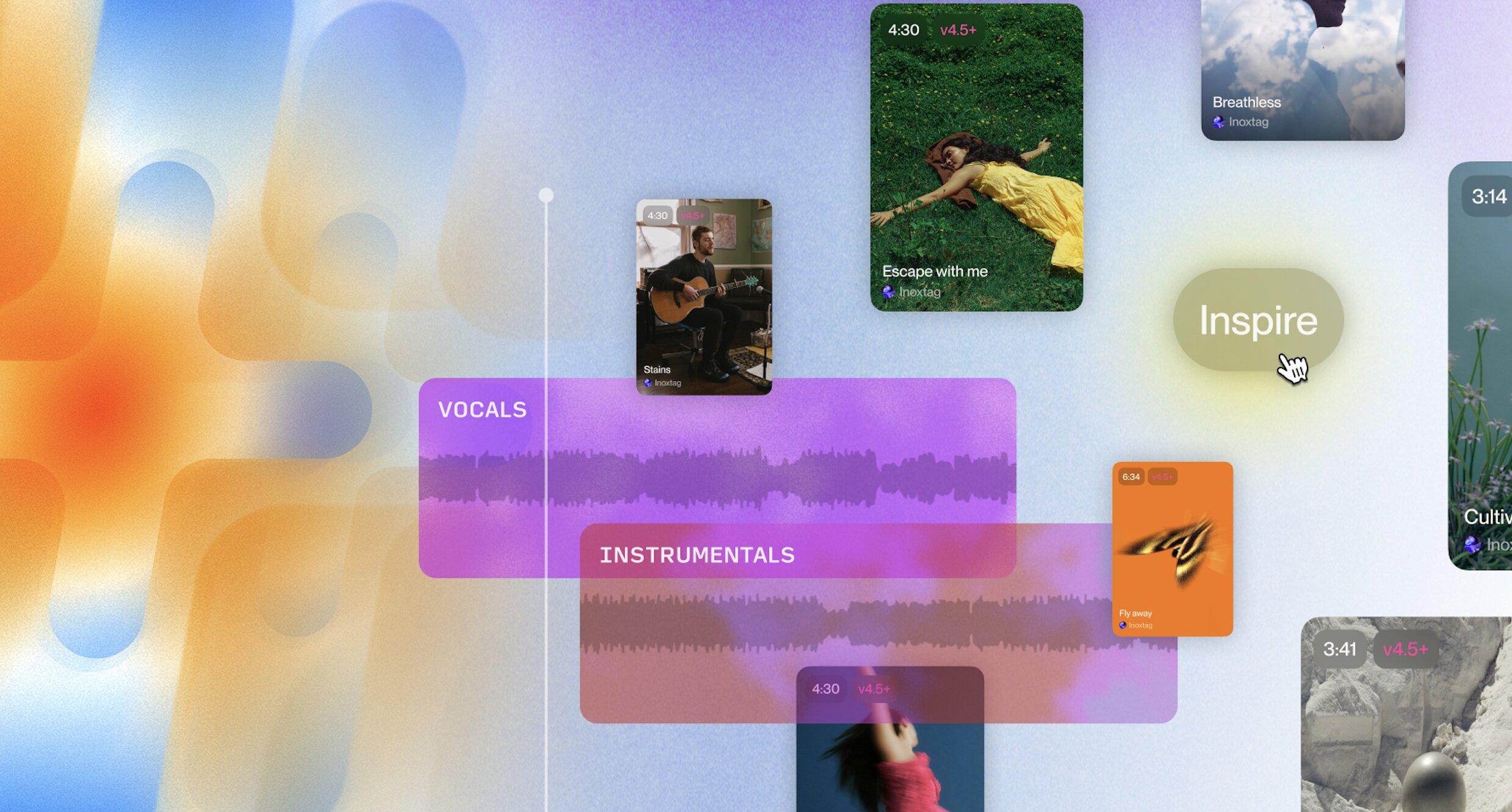As high-stakes copyright lawsuits against Suno rumble on, the AI music generator has launched an update with what it claims to be “previously unimaginable capabilities” for “generative, studio-quality music creation”.
The version 4.5+ release introduces three new features, which Suno calls “first-of-their-kind professional audio production tools”.
“Add Vocals” allows users to layer vocals onto instrumental tracks, while “Add Instrumentals” enables users to add AI-generated backing tracks to vocal recordings. “Inspire” promises to create songs based on user-curated playlists.
The v4.5+ release follows Suno’s acquisition of WavTool in June, which brought browser-based digital audio workstation technology to the platform. WavTool’s capabilities include VST plugin support, sample-accurate editing, live recording, stem separation, and AI-generated MIDI functionality.
Earlier in June, Suno released an updated editing interface featuring an advanced song editor, stem separation capabilities, and audio upload functionality.
The new features suggest Suno is increasingly targeting professional or aspiring professional music makers rather than just AI music-making hobbyists.
The latest capabilities appear to be designed for users who want to layer and manipulate existing audio components rather than simply generate complete songs from text prompts.
The announcement also comes as Suno attempts to strengthen its music industry connections with the recent appointment of Paul Sinclair as Chief Music Officer.
Sinclair, who spent over two decades at Warner Music Group in various roles including General Manager and Executive Vice President of Atlantic Records, will “guide how Suno’s AI-powered tools are integrated into the process of songmaking,” according to the company.
Suno’s new “Add Vocals” feature lets users start with an instrumental track, either generated by Suno or uploaded from their own files, and transform it into a complete song by adding vocals.
“Add Instrumentals” works in reverse, allowing users to upload voice recordings or vocal stems and add Suno-generated instrumentals underneath based on text prompts. The feature is designed to transform voice recordings into full productions.
The “Inspire” feature, meanwhile, analyzes user-created playlists to understand the user’s musical preferences.
“This isn’t a minor upgrade; it’s a glimpse of the future: more people making more music, with better tools, in more intuitive ways.”
Mikey Shulman, Suno
“I’m really excited about this release,” said Mikey Shulman, CEO & Co-Founder, Suno.
“We’re not just giving users a better model that makes better music — we’re introducing new workflows that change how music gets made. This isn’t a minor upgrade; it’s a glimpse of the future: more people making more music, with better tools, in more intuitive ways.”
The company claims that the “Add Vocals” and “Add Instrumentals” features “will continue to improve” with increased usage.
Suno raised $125 million in funding in 2024, valuing the Massachusetts-headquartered company at $500 million. The funding round was led by Lightspeed Venture Partners and included investors such as Founder Collective, Nat Friedman, and Daniel Gross.
The AI music generation platform faces legal challenges on multiple fronts. In June 2024, Sony Music Entertainment, Universal Music Group, and Warner Music Group sued Suno for alleged copyright infringement, claiming the company used their recordings without permission to train its AI models.
Suno and rival platform Udio subsequently admitted to using copyrighted music in their training data, arguing their use falls under fair use exemptions to copyright law.
Adding to its legal troubles, German collection society GEMA sued Suno in January 2025 for allegedly “processing protected recordings of world-famous songs” without permission or remuneration. GEMA accused Suno of generating content “confusingly similar” to original songs by artists including Alphaville, Lou Bega, and Modern Talking.
Last month, Suno and Udio were hit with a class-action lawsuit filed by country musician Tony Justice.
Despite facing multiple legal challenges, Suno has continued to pursue partnerships with prominent figures in the music industry. The company named Grammy-winning producer Timbaland as a strategic advisor in October 2024, with Timbaland taking an active role in day-to-day product development and strategic creative direction.
Despite the legal proceedings, Bloomberg reported last month that the major music companies are in licensing talks with both Suno and Udio, seeking license fees and equity stakes in the platforms.
The Wall Street Journal reported that the major music companies are pushing for Content ID-style fingerprinting technology in their licensing talks with Suno and Udio, which would enable tracking of when and how particular songs are used by the AI platforms.
Suno stated that additional product updates will be released in the coming months.
Music Business Worldwide








